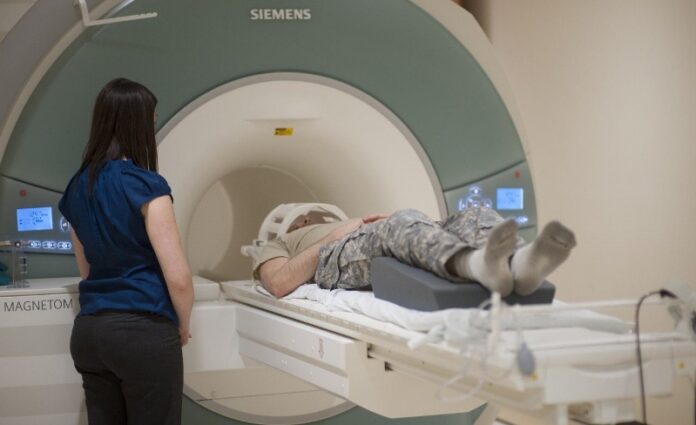
Scientists at two of Virginia’s largest universities, working with clinicians from the two major health systems and a growing Virginia-based biotechnology company, have teamed up to address an important medical challenge — how do you accurately diagnose a mild traumatic brain injury that has subtle or no physical signs but can cause long-term damage?
The project has won the support of the Virginia Catalyst, formerly known as the Virginia Biosciences Health Research Corp., which has awarded a $500,000 grant to the Virginia Tech Carilion Research Institute (VTCRI) to further develop and commercialize a multi-modality system approach to aid in the diagnosis and management of mild traumatic brain injury, known as mTBI.
A core component of the system is a blood-based test that can also be administered directly at the point of care, providing rapid results. The VTCRI will serve as the first anchor research and demonstration site.
Brain injuries, including concussions, can be silent and occur without any loss of consciousness. “Crucial decisions have to be made at the time of a head injury,” said Mike Grisham, chief executive officer of the Virginia Catalyst. “It is essential to develop a comprehensive approach to determine whether people can safely return to school, work, the sports field, or the battlefield — or whether they need additional therapy.”

“VTCRI scientists are determined to find scientifically sound, practical solutions to the nation’s most pressing health problems,” said Michael J. Friedlander, the executive director of the Virginia Tech Carilion Research Institute and principal investigator for the project.
Co-principal investigator Stephen LaConte, an associate professor at the Virginia Tech Carilion Research Institute, and Friedlander, will work with investigators at the University of Virginia to conduct research to compare the readings produced by the diagnostic test with readings from both structural and functional MRI brain scans and cognitive tests.
The athletic departments at the University of Virginia and Virginia Tech, including Virginia Tech football team physician Gunnar Brolinson, the vice provost for research at the Edward Via College of Osteopathic Medicine, are expected to recruit volunteers for part of the research program.

“Both the University of Virginia and Virginia Tech have access to great emergency and athletic departments,” LaConte said. “Virginia Tech brings a history of research in athletics and concussions, including biomechanics and helmet instrumentation research by Stefan Duma (the Harry Wyatt Professor of Engineering and the director of the Institute for Critical Technology and Applied Science) and his team. We added brain imaging to a track record of research productivity with Virginia Tech athletics and Carilion Clinic’s emergency medicine department. UVA mirrors those exact themes. We were able to put all the pieces together. It is very exciting.”
Traumatic brain injury is a major cause of death and disability in the United States, according to the Centers of Disease Control and Prevention. TBIs contribute to about 30 percent of all injury deaths. Survivors of TBI can face effects that last a few days or the rest of their lives.
